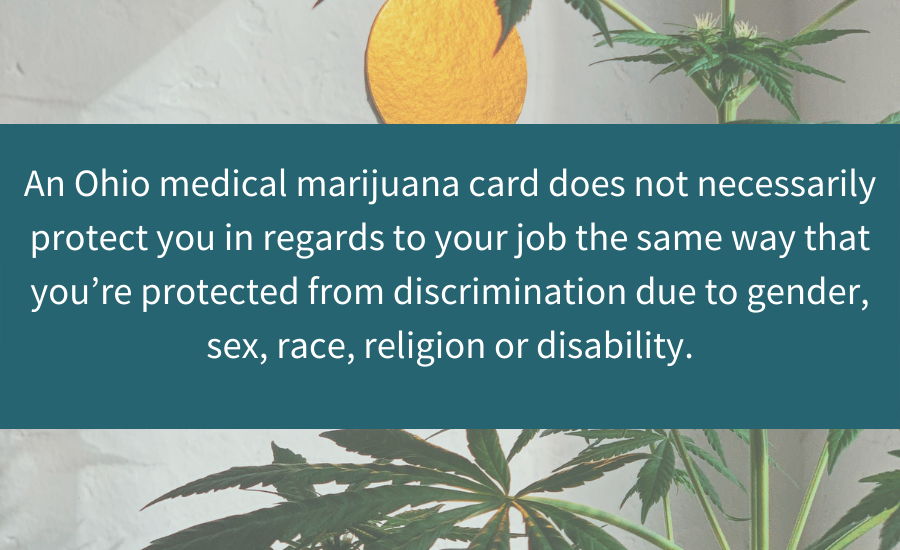Short answer: According to the law, an Ohio medical marijuana card does not authorize you to do your job under the influence of medical marijuana in a way that impairs your ability to perform your work.
As of September 8, 2016, House Bill 523 went into effect, legalizing medical marijuana for residents of Ohio. Among the provisions of the bill was the formal establishment of the Ohio Medical Marijuana Control Program (OMMCP) to regulate medical marijuana in the state and issue medical marijuana cards to qualifying patients. These regulations lay out the protections now legally granted to medical marijuana patients as well as certain restrictions under the law.
In the case of employment, as an Ohio medical marijuana patient, you have certain rights and restrictions as an employee or applicant for employment regarding medical marijuana on the job or at the workplace where. So, too, do employers.
In this article, you’ll learn what each of these is, and how you can protect yourself personally and professionally, whether you’re an employee with an Ohio medical marijuana card or an employer of such a person.
Read also: Ohio Medical Marijuana Laws 2022.
Employee Restrictions
An Ohio medical marijuana card allows you to purchase, possess and use medical marijuana to treat your condition and grants you legal protections when exercising those rights. There are, however, restrictions on those permissions, including in the workplace. An Ohio medical marijuana card does not necessarily protect you in regards to your job the same way that you’re protected from discrimination due to gender, sex, race, religion or disability.
Being Under the Influence
Even if your employer has a relatively lenient medical marijuana policy, that does not give you the right to come to work “high.” An Ohio medical marijuana card does not authorize you to do your job under the influence of medical marijuana in a way that impairs your ability to perform your work.
You also cannot violate any OSHA regulations or workplace-instituted health and safety policies under the auspices of being a medical marijuana patient.
Form of Medical Marijuana
Medical marijuana comes in many forms, from the dried and cured flowers plucked from the plant to manufactured products like tinctures, edibles, oils, and patches. Not all forms of medical marijuana are covered under Ohio Medical Marijuana Law.
Specifically, you cannot smoke marijuana in Ohio, even if it’s legitimately purchased and possessed medical marijuana; you can, however, vaporize the flower in a vaporizer. You can also purchase, possess, and use manufactured forms of medical marijuana like those just listed above.
Suing an Employer
As with any other violation of your rights, you can sue an employer for damages. This includes action taken against you under the guise of the safety-sensitivity exception.
However, if you plan on retaining or regaining employment with that employer, it is unlikely to occur after you sue them. For this reason, many medical marijuana users who find their rights violated in the workplace or on the job settle their claims out of court. Even in these instances, however, reemployment is no guarantee and can even be rare.
Read also: How To Renew a Medical Marijuana Card in Ohio.
Employer Protections
Medical marijuana law grants Ohio residents the right to apply for a medical marijuana card and utilize medical marijuana legally for treatment of a qualifying medical condition. That does not mean, however, that an employer has no right to protect their business and workplace from abuse or violation of these laws.
Medical Marijuana and Workers’ Compensation in Ohio
According to the Ohio Bureau of Workers’ Compensation (BWC) Ohio’s Medical Marijuana Law has only a limited impact on workers’ compensation in the state. It does not negatively impact the BWC’s Drug-free Safety Program, and if an employee is injured as a result of being under the influence of marijuana, even medical marijuana legally authorized by a physician, they are ineligible for workers’ compensation.
Other Employer Protections
Other ways Ohio’s medical marijuana law does or doesn’t impact employers and employees in the state include:
- It does not require employers to accommodate an employee’s medical marijuana possession, use or distribution, whether in the workplace or outside of it.
- It does not require the bureau to pay for employees’ medical marijuana.
- It does not prohibit employers from establishing a drug-free workplace or instituting a zero-tolerance policy that forbids employees from being impaired by or under the influence of medical marijuana.
- It does not prohibit employers from refusing to hire a candidate for employment or from discharging or taking disciplinary action against an employee due to their medical marijuana use.

Consideration for Ohio Employers
As an employer in Ohio, you have great leniency over how you choose to run your workplace, including in regards to medical marijuana. That said, there are several reasons why you may want to avoid an overly restrictive stance. Here are some of the important facts to keep in mind when you consider how to respond to medical marijuana law in your place of business.
Only qualified patients can get a medical marijuana card allowing them to legally possess and use medical marijuana in the state. In other words, to be considered a legal medical marijuana user in the state of Ohio, a person must possess a valid, unexpired medical marijuana card issued by the OMMCP.
To get such a card a patient must:
- Have a physician’s diagnosis for one or more of the qualifying conditions Ohio lists for medical marijuana
- Have registered with the state as a medical marijuana patient
- Received an official, written recommendation for medical marijuana from a licensed Ohio physician
Read also: Can Chronic Pain Be a Qualifying Condition For Medical Card in Ohio?
This means anyone claiming medical marijuana patient status must meet all of those requirements to get the necessary card to prove their medical marijuana status; it also means that, if an employee does have a valid and unexpired Ohio medical marijuana card, you can be assured that employee has been properly vetted and does, indeed, qualify for medical marijuana under state law.
This doesn’t change the rights you’re permitted to grant and the restrictions you’re allowed to impose under Ohio Medical Marijuana Law. But it may give you cause to consider greater leniency or tolerance when devising your business’s medical marijuana policies and dealing with such employees.
On one end of the spectrum, you can choose to accommodate an employee’s medical marijuana status; on the other end, you can institute a zero-tolerance policy for all controlled substances.
Taking these facts into account when you devise your business’s medical marijuana policies can help you avoid on-the-job risks and possible litigation, be it from a discharged medical marijuana user, an employee impaired on the job, or a rejected applicant for employment.
Maintaining a Drug-free Workplace
Just be sure, if you choose this route, that it’s uniformly applied to all employees and for all controlled substances the company restricts, not just marijuana.
If you randomly drug test employees, make sure you’re consistent in your testing policies. You can test all employees or only employees in certain roles, like safety-sensitive positions, such as those requiring a commercial driver’s license or involving operating heavy machinery or performing medical work.
If, instead, you unfairly target medical marijuana users with your policy, you could be accused of workplace discrimination. This is why it’s so important that you get down your policies for on-premise and off-premise or on-the-job and off-the-job medical marijuana use. If, for example, you intend to challenge a former employee’s unemployment benefits, such a comprehensive written policy could end up protecting you and supporting your case.
Employers should adequately inform and remind employees of the company’s medical marijuana policies. This includes making these policies clear in your job descriptions and hiring policies.
Accommodating Disabilities
As an Ohio employer, you may not be required to accommodate an employee’s medical marijuana use, but you are required to accommodate an employee’s disability. Many medical marijuana patients legally qualify as disabled. While you can prevent even such an employee from using medical marijuana or being under the influence of it on the job, you cannot hire, refuse to hire, discharge or take disciplinary action against an employee for their disability, and you must make reasonable accommodations for them to be able to perform their job.
Be aware that you must apply such accommodations equally across the board for other individuals with unique situations, such as minority workers.
Read also: A Detailed Guide on How To Get a Medical Marijuana Card in Ohio.
For Both Employers and Employees
In closing, both employers and employees need to keep in mind that medical marijuana laws differ from state to state, including laws pertaining to medical marijuana and employment. If you’re an employer with offices in several states, you need to learn and follow the medical marijuana laws of each of those states. If an employee is transferred from an office in one state to another, the laws of the new state thereafter apply to that employee’s medical marijuana status and use.
If you want to become a legal marijuana patient and learn all the details of the correct use and dosage of medical marijuana, you need to contact a certified doctor. We will help you do it as quickly as possible. Right now, by clicking on the link below, you can book an online appointment with a professional doctor who will help you understand if you qualify for a medical card and if yes, assist you with this process.

